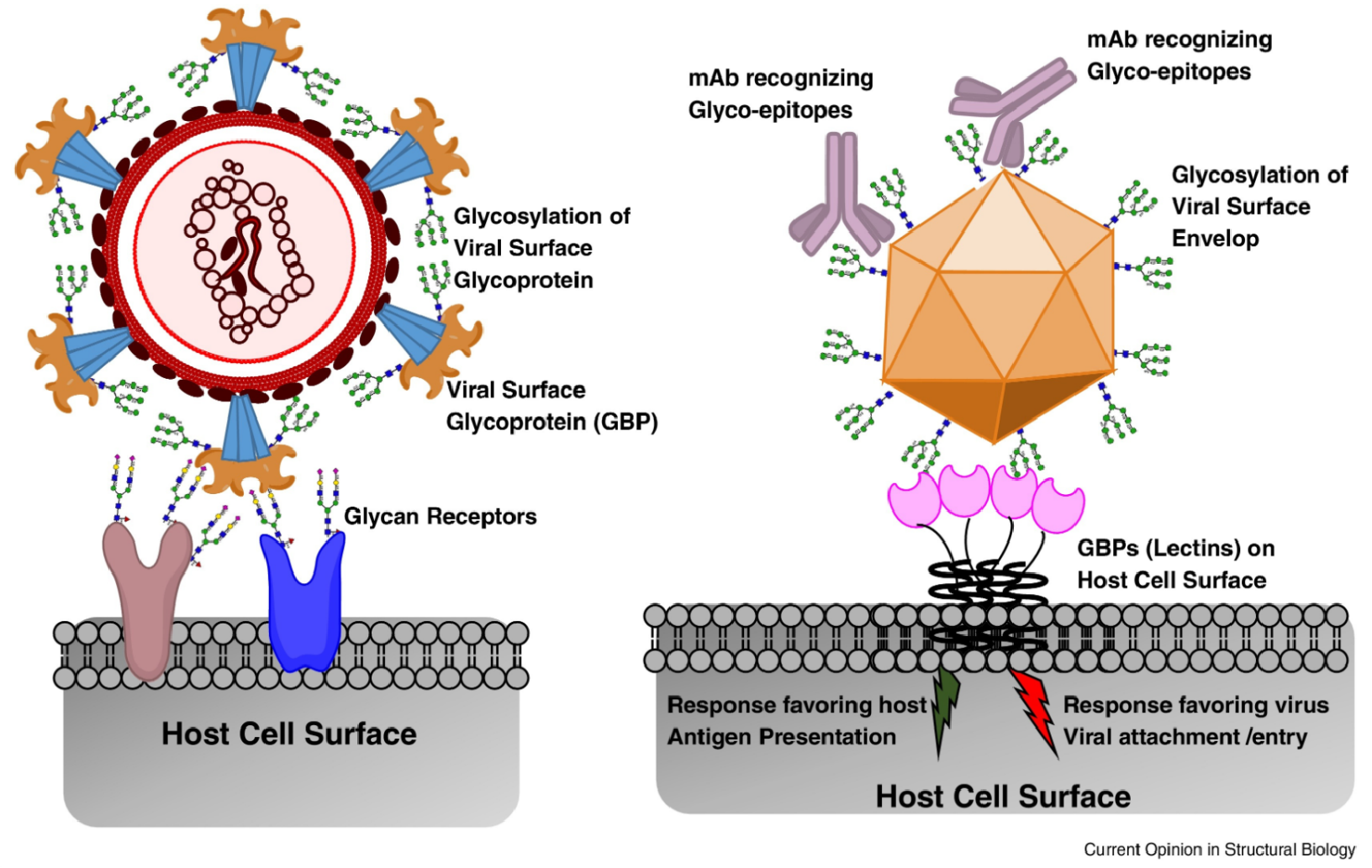Glycosylation-Protein Interaction Analysis Service
Glycosylation-protein interactions refer to the binding events mediated by glycans attached to proteins and their interaction partners, including receptors, ligands, antibodies, or other proteins. These interactions are a key component of molecular recognition, enabling cells to communicate, respond to external stimuli, and regulate physiological processes. Such interactions play crucial roles across biology and medicine. They regulate immune responses by guiding antibody and receptor binding, mediate host-pathogen recognition during infections, and influence protein stability, solubility, and trafficking. In therapeutic proteins, glycosylation-protein interactions determine pharmacokinetics, efficacy, and immunogenicity, making them highly relevant for drug design and quality control.

Figure 1. Schematic of Complex Glycans in the Interplay Between Virus and Host
A defining feature of glycosylation-protein interactions is their structural complexity and heterogeneity. Glycans are composed of diverse monosaccharides with branching, linkage variations, and site-specific occupancy, producing multiple glycoforms for a single protein. These subtle differences can dramatically alter binding affinities and biological outcomes. Moreover, glycosylation is dynamic and context-dependent, changing with cell type, tissue, developmental stage, and disease state. Because of these characteristics, the systematic analysis of glycosylation-protein interactions is essential. Without advanced enrichment, structural elucidation, and quantitative profiling, critical insights into disease mechanisms, biomarker identification, and therapeutic optimization would remain obscured. Glycosylation-protein interaction analysis provides the foundation for understanding molecular recognition in both health and disease.
Service at MtoZ Biolabs
MtoZ Biolabs provides a specialized Glycosylation-Protein Interaction Analysis Service integrating advanced experimental and analytical techniques to deliver comprehensive insights into how glycans mediate or regulate protein interaction. Our service is designed to support both basic research and translational applications in disease biology, biomarker discovery, and therapeutic development.
Using high-resolution mass spectrometry and chromatographic platforms, we perform detailed profiling of glycans associated with proteins. This includes structural identification, quantitative evaluation of glycan abundance, and assessment of microheterogeneity. By clarifying how specific glycans influence molecular recognition, our service provides critical data for understanding signaling pathways and disease-associated alterations.
We apply lectin-based microarray screening to investigate the binding preferences of proteins toward different glycan motifs. This high-throughput strategy captures the diversity of glycan-protein interactions and generates comprehensive binding signatures. These results help define recognition patterns, highlight key glycan ligands, and support studies in immunity, host-pathogen communication, and biomarker discovery.
🔸Glycoprotein Interaction Analysis
To examine the strength and kinetics of glycan-mediated interactions, we employ biophysical methods such as surface plasmon resonance (SPR) and isothermal titration calorimetry (ITC). These approaches deliver quantitative information on binding affinity, kinetics, and thermodynamic profiles. The resulting data offer mechanistic insights into how glycosylation affects protein recognition and therapeutic efficacy, facilitating the identification of potential drug targets.
Our LC-MS/MS-based workflows enable precise localization of glycosylation sites on proteins. We determine which amino acid residues are modified, assess site-specific heterogeneity, and evaluate structural diversity. This information is essential for linking glycosylation patterns to functional outcomes, improving therapeutic protein design, and ensuring regulatory compliance in biopharmaceutical development.
Service Advantages
✔️Advanced Analytical Platforms
Integration of mass spectrometry, lectin microarray, SPR, ITC, and LC-MS/MS ensures high-resolution and reliable results.
✔️Multi-Dimensional Insights
Coverage from glycan profiling to site mapping, providing both structural and functional perspectives of glycosylation-protein interactions.
✔️Customizable Workflows
Flexible solutions tailored to diverse needs in disease mechanism research, therapeutic development, and clinical biomarker validation.
✔️One-Time-Charge
Our pricing is transparent, no hidden fees or additional costs.
Applications
1. Disease Mechanism Research
Analysis of glycosylation-protein interactions provides insights into how altered glycan patterns contribute to cancer progression, autoimmune diseases, infectious diseases, and neurodegenerative disorders. This helps identify disease-specific interaction pathways and potential therapeutic targets.
2. Clinical Diagnostics
Glycosylation changes can serve as sensitive biomarkers. By characterizing glycan-mediated protein interactions in clinical samples such as serum or plasma, our service supports the discovery of diagnostic markers and patient stratification strategies.
3. Drug Development
In therapeutic design, glycosylation strongly influences antibody-receptor binding, drug half-life, and immunogenicity. Interaction analysis supports the optimization of therapeutic proteins, monoclonal antibodies, and vaccines by clarifying the role of glycosylation in pharmacological activity.
4. Biopharmaceutical Quality Control
Glycosylation is a critical quality attribute in biologics. Our service helps ensure lot-to-lot consistency and regulatory compliance by monitoring glycan-protein interactions that affect stability, potency, and safety.
Sample Submission Suggestions

If you have special sample types or require additional guidance, please contact us for personalized support before sample preparation.
Deliverables
1. Comprehensive Experimental Details
2. Materials, Instruments, and Methods
3. Total Ion Chromatogram & Quality Control Assessment (project-dependent)
4. Data Analysis, Preprocessing, and Estimation (project-dependent)
5. Bioinformatics Analysis
6. Raw Data Files
Related Services
Glycoprotein Interaction Analysis Service
How to order?







